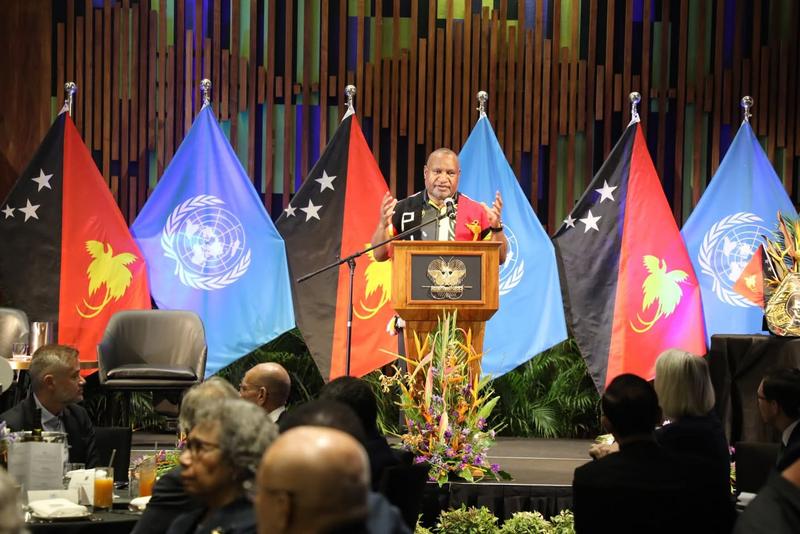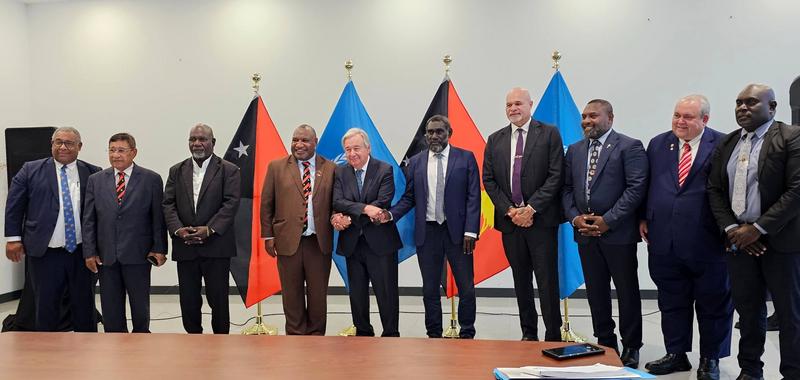Prime Minister James Marape on 5 September farewelled United Nations Secretary-General António Guterres after a four-day visit that placed Papua New Guinea at the heart of global discussions on climate change and sustainable development.
Guterres departed from Jacksons International Airport aboard a UN flight, concluding what Marape described as a “productive and meaningful” visit. A military guard of honour lined the tarmac, while Foreign Minister Justin Tkatchenko, Chief Secretary Ivan Pomaleu and Foreign Affairs Secretary Elias Wohengu joined the Prime Minister in extending a formal send-off.
“Papua New Guinea deeply appreciates the Secretary-General’s passion and commitment in promoting the United Nations Sustainable Development Goals, including Climate Action, during his time with us,” Marape said at a joint press conference with Guterres before departure.
The UN chief’s programme was wide-ranging. He addressed PNG’s National Parliament, a rare honour for an international leader, before travelling to East Sepik Province to pay tribute to the late Grand Chief Sir Michael Somare at his memorial in Wewak.
Guterres described Somare as an “extraordinary statesman” whose advocacy on forest conservation helped shape Articles 5 and 6 of the Paris Agreement on climate change.
He then took an aerial tour of the Torricelli mountains rainforest and visited Nuku District in West Sepik, where he met communities living on the frontlines of climate change. In Mt Hagen, he engaged late into the night with UN representatives and civil society leaders overseeing development projects in the Highlands.
For Marape, the visit was not just ceremonial but a chance to align PNG firmly with the UN’s climate agenda. At a state dinner on 3 September, he assured Guterres of PNG’s unwavering support.

“Mr. Secretary-General, you have come home to a forest nation, you have come home to a marine nation,” he said. “Your address today in Parliament on Climate Resilience and Climate Justice is the correct advocacy. We stand behind you. We stand in total solidarity with you as you advocate to the Global North and G20 nations… Keep the earth’s temperature below 1.5-degree Celsius.”
Marape has emerged as one of the Pacific’s strongest voices on climate justice since taking office in 2019. He has demanded that developed countries not only cut emissions but also compensate small island states for damages caused by rising seas and extreme weather. He has also insisted that forest nations like PNG be recognised and rewarded for preserving ecosystems of immense global value.
By hosting the UN chief during its 50th independence anniversary year, PNG signalled that it sees climate diplomacy and sustainable development as defining priorities for the decades ahead.
UN chief joins Marape, Toroama for Bougainville peace talks
Guterres added his weight to Papua New Guinea’s delicate peace process with Bougainville this week, joining Marape and Autonomous Bougainville Government (ABG) President Ishmael Toroama for a trilateral meeting in Port Moresby.
The talks, held during Guterres’ four-day state visit, were described as “honest” by PNG officials and centred on the next steps of the Bougainville Peace Agreement, which guides the political future of the autonomous region. Bougainville voted overwhelmingly for independence in a 2019 referendum, but both sides agreed that the result would be subject to further consultations before a final outcome is reached by 2027.
Marape said the UN’s continued involvement was crucial. “The United Nation’s close guidance and consult going forward, as PNG and Bougainville work towards lasting solution is crucial at this stage leading to 2027,” his office said in a statement following the meeting.

The trilateral dialogue underscored the growing importance of international oversight as Bougainville’s demands for independence gather momentum. For many observers, Guterres’ presence was a reminder of the UN’s longstanding role in the peace process, dating back to its monitoring mission during the early 2000s.
Beyond symbolism, the meeting gave Toroama and Marape an opportunity to present their positions before the world’s top diplomat. While details of the talks remain confidential, both leaders are under pressure to balance Bougainville’s referendum mandate with PNG’s broader national interests.
The session came against the backdrop of Guterres’ wider tour of PNG, which was dominated by climate change advocacy and tributes to the late Grand Chief Sir Michael Somare. Yet the Bougainville dialogue added a distinctly political dimension, signalling that peace and governance remain high on the UN’s agenda in the Pacific.
For Bougainvilleans, the Secretary-General’s involvement brought international visibility to their cause. For PNG, it was a chance to demonstrate transparency in handling one of the most sensitive national issues of the post-independence era.
The meeting was also significant for its timing, coinciding with PNG’s 50th independence anniversary year. Leaders on both sides have framed the coming years as a period to settle Bougainville’s status in a way that ensures peace, stability and development for all communities.
By standing alongside Marape and Toroama, Guterres signalled the UN’s readiness to remain a trusted partner in guiding the process to its conclusion.










